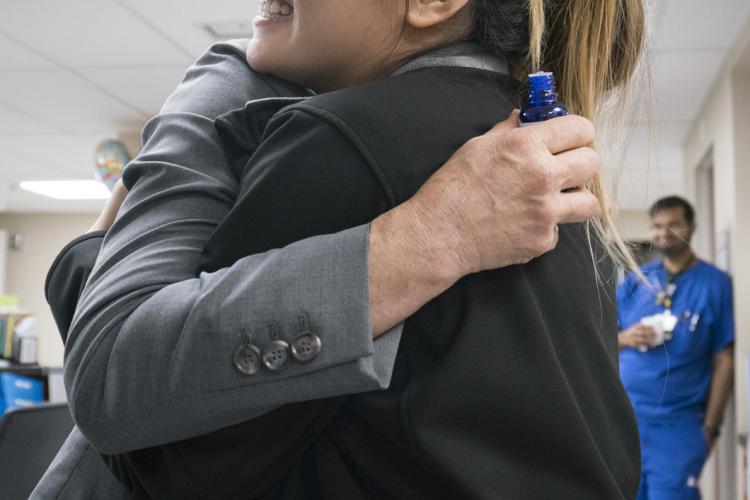
When they’re giving everything they have to their patients, it’s easy for healthcare providers to forget to make time to take care of themselves.
So, JPS Health Network has started a new program to make sure its doctors don’t overstress or burn themselves out. Called a Resident Check, the program calls for first and second-year residents to attend meetings with an Employee Assistance Program counselor at least once every six months to help new doctors learn to balance their lives with their work.
“Just like I ought to see my dentist every six months whether or not my teeth hurt, first- and second-year residents meet with EAP to discuss how things are going,” said Jeff Christie, Director of the JPS Employee Assistance Program. “If they’re going well, we want to know about it so we can share it with others. ‘What are the things you are doing in your life to keep it that way?’ If the resident says, ‘Now that you mention it, I am struggling,’ we have an opportunity for an early intervention.”
Christie said JPS leaders believe preventative maintenance for the mental health of young doctors is important because caregivers too often put themselves last due to long hours and the emotionally demanding nature of the job.
“The analogy I often use is that we’re all water wells and everyone is asking for a certain number of buckets. Our family, our friends, and in the case of doctors, our patients all want some of what we have to offer,” Christie said. “No matter how much of a giver you want to be, without refreshing your water supply, you’re going to run dry. So, the question is, ‘What can we do to try to add more water to that supply?’”
Christie said hospitals are filled with compassionate people who give their lives to help others be healthy. But sometimes problems don’t have solutions and it can be difficult for physicians to accept that they put their all into healing a person who, ultimately, doesn’t survive.
“The wonderful part of working here is that you have people who tend to score very high in things like compassion and caring” on personality tests, Christie said. “But any good quality taken to excess can be harmful. So we worry about those who give too much.”
Traditionally, doctor burnout has been tough to recognize because physicians sometimes internalize their problems. There is a reluctance to share concerns with their peers or an outside source of help. That’s why JPS leaders hope to create a culture of sharing by requiring the health network’s newest doctors to engage EAP.
“To be honest, we thought we would have some reluctance at first,” Christie said, explaining that, unfortunately, it is natural for people to feel that accepting help is a sign of weakness. “We implemented it on Jan. 1 with first-year residents. Of 50 individuals, only two expressed any kind of resistance and said, ‘Why do we have to do this?’ The rest seemed to be very receptive to it -- and some even mentioned that they had a similar program at the school they attended.”
Christie said, while the health network doesn’t have the staff to require biannual check-ins from longer-tenured doctors, he said he hopes physicians beyond their first two years will feel empowered to ask for a meeting with a counselor if they need it in the future.
Additional services available to providers of any seniority include:
Schwartz Rounds, bi-monthly group meetings for caregivers during which issues that cause stress and burnout are discussed.
Critical Incident Debriefings are held as needed, usually in response to a traumatic loss of a patient or sometimes a caregiver.
Individual EAP services in which team members can set up a one-on-one meeting with a counselor to discuss issues that they could use some help sorting out. The sessions are completely confidential and free of charge.
Trauma Circle is a group discussion to which anyone affected by trauma is invited. It could be a care provider, a former patient, a family member of a patient or anyone who is struggling to cope with loss.
Soul Café is a service in which chaplains, upon request, visit with caregivers. They show up with cart that includes comfort foods including tea and chocolates plus soothing essential oils to create a calming a refreshing experience to ease tensions caused by job stress and loss.
